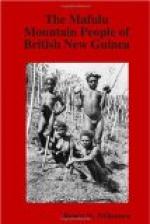Each of the magic men then wraps up the portion of food which has been given to him in the piece of band; and this he again wraps up in leaves, and continues doing so until the parcel has become a round ball 4 or 5 inches in diameter. The men then separate, and each of them goes off alone to a spot outside the village, where he collects some very dry firewood, and heaps it up against the trunk of a tree to a height of, say, 6 feet. He then engages in an incantation, after which he puts the ball inside the bottom of the wood pile, and lights the pile at the bottom. Then he lies down by this fire and closes his eyes. After an interval of perhaps two to five minutes he gets up, as though awakening from a bad dream, and hears the wailing in the adjoining village, and asks himself what all this wailing is about; and he then appears to remember for what purpose he is there, goes to the fire, and takes out the ball. If the fire has burnt or scorched the food wrapped up in the ball, it is an indication that the chief is to die. If not, it indicates that he will live. These magic men then return to the village, and report the result. If their report be that the chief is going to live, the people cease their wailing, but if it be that he is to die, the wailing continues.
Pausing here for a moment, I may admit that, though I have told the tale of this ceremony, with its private cogitations—real or pretended—of the magic men, as it was told to me, the tale is open to obvious questions. How can a magic man from a distant community hear the wailing? What would happen if the results of the ceremonies of the various magic men were to differ? What would be the situation if a chief whose death was indicated by the ceremony lived, or if one whose recovery was foretold became worse and died? All these points I tried to elucidate without success; but possibly the answer to the query as to divergence of results may be that the men take care that the results of their experiments shall not differ.
It is believed by the natives that, if a hostile community can secure some of the food remnants and band, and hand them to their own magic man, for him to go through the same ceremony, he may maliciously bring about an unfavourable result, and thus may cause the death of the chief. If the belief that such a thing had happened arose, it would be a casus belli with that other community; and a case is known in which an inter-community fight did occur on this ground.
If the report be that the chief is to die, the special woman attendant will give him the blow on the head, as in the case of the ordinary villager. The shouting of the men outside when the chiefs death is announced is much louder than in the case of a commoner; and as they shout they brandish their spears, and strike the roof of the chiefs house with the spear points, and some of the men strike it with adzes and clubs. The spreading of the news to other communities




